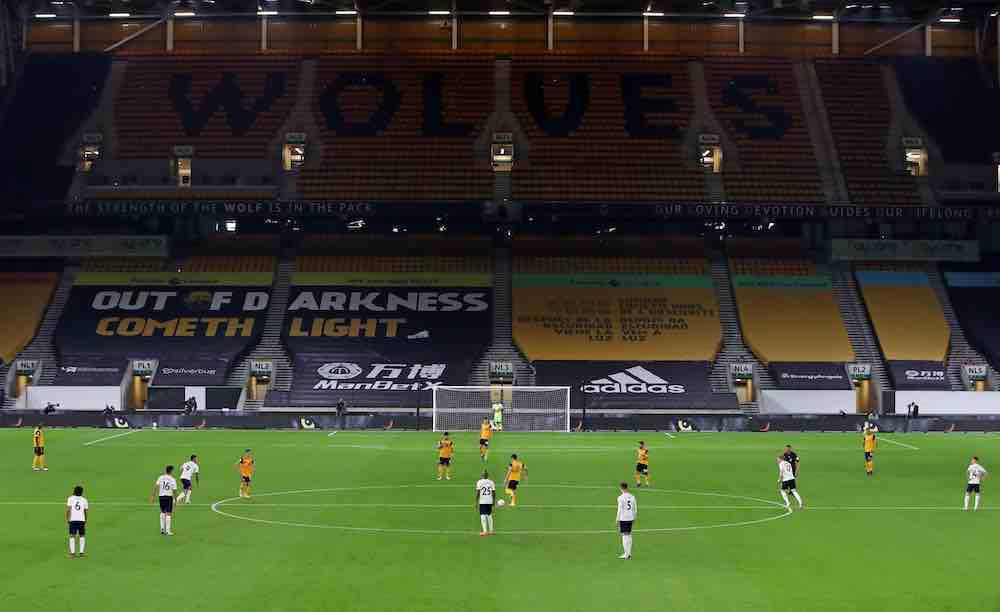On November 19, the UK sports industry received the welcome news that £300million had been made available to help the sector survive amidst the coronavirus pandemic. Football is one of eleven sports that has been promised funds, with the government allocating £28million to support football in England. But the funding comes with some caveats and some noticeable restrictions.
Firstly, and most noticeably, the bailout at present is only for football in England and excludes football in Scotland, Northern Ireland, and Wales, with each devolved government having to take responsibility for the leagues in their respective nations. It is unclear what plans are currently in place to support football teams outside of England.
Of the £28million that has been allocated to football, none of it is for the Premier League or the Football League, or any of the teams that compete in these competitions. The money has been allocated in the following way:
- National League (steps 1-2): £11million
- National League (steps 3-6): £14million
- Women’s Football (Super League & Championship): £3million
While many outside observers might not harbour a great deal of sympathy for the country’s elite footballers, the Premier League has undoubtedly suffered like many other businesses and institutions due to the coronavirus pandemic.
Earlier this year, The Guardian published an article sharing a report that predicted Premier League clubs could share a collective loss of approximately £500million due to COVID19.[1] Due mainly to the drop in income from broadcasting, ticket sales, and other matchday revenue streams, clubs at the top of the football pyramid have certainly been negatively impacted by coronavirus.
Although it’s unlikely that any Premier League club will suffer irreparable financial damage due to the coronavirus, the same, unfortunately, cannot be said for a plethora of Football League clubs that are perilously close to collapse.
Perhaps the most damning example of this is Macclesfield Town, who were wound up in September over debts totalling more than £500,000. Although not entirely due to COVID19, their plight certainly wasn’t helped by the restrictions imposed to combat the virus’s spread, and it seems that it may just have been the final nail in their coffin.
Other Football League clubs are also in dire financial situations because of the pandemic and would undoubtedly benefit from a share of the £300million. Many of these clubs have had reduced funding and sponsorship with betting companies like MansionBet and findbettingsites.co.uk pulling advertisements over the last few months. If we take League Two Leyton Orient as an example, the club’s owner Nigel Travis estimates that the coronavirus would contribute to an additional loss of approximately £1.5million, a considerable sum of money for the club. Travis said that ‘we’re getting very little help from the government. They need to step up and give football some support.’ [2]
Unfortunately for Leyton Orient and the other 91 league clubs, that support has arrived; it just isn’t available to them. Instead, clubs competing in the National League will have access to £25million, a boost that is undoubtedly much needed.
Earlier in the year, the National League hoped for a package from the government in the region of £2-3million per month[3]. What they’ve received certainly covers that, and there’s hope that it will keep many of the clubs competing at that level afloat throughout the winter.
Only £3million of the £28million available has been allocated to the women’s game, which is to be shared between the Women’s Super League and the Women’s Championship. Although operating budgets within the women’s game are significantly smaller than the men’s, it still seems like a small amount of money to support 23 teams.
To a certain extent, it’s positive to see a proportion of the £300million government bailout going to the bottom end of the football pyramid, and the beneficiaries are likely to be grateful for the support. However, at the top of the pyramid, more needs to be done to support clubs like Leyton Orient that will miss out all-together.
With an estimated cushion of £9.2billion thanks to broadcasting contracts, it’s widely thought that Premier League clubs could do more to support those at the bottom of the Football League. The Premier League has agreed a £50million package to cover lost gate receipts for teams in League One and Two, which will hopefully go some way to supporting the clubs most in need.[4]
What is abundantly clear is that without fans, football clubs will continue to struggle financially. The £28million government bailout will be a welcome boost for clubs at the bottom, but a longer-term vision is needed, with the return of fans a high priority for all clubs throughout the football pyramid.
[2] https://www.mirror.co.uk/sport/football/news/four-demands-action-help-save-22739120
[3] https://www.bbc.co.uk/sport/football/54352735
[4] https://www.ft.com/content/9fee4844-c9a9-4c4c-a805-3b4d86de6fe2


COMMENTS
Lots of people enjoy football but not EVERYONE does so why should EVERYONE be expected to pay for this handout? It is a MINORITY supported game so doesn’t deserve taxpayers money.
EVERYONE associated with organising this game has been proven to be unbelievably greedy and they ALL have plenty of money to last a couple of lifetimes.
FEEDING THEIR GREED IS UNFORGIVABLE.